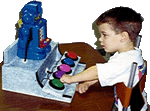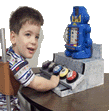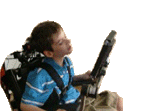|
PC-0214
|
The easy-to-use binder featuring 800 Questions and Answers and
800 Practice Activities provides teachers and counselors with
high-interest subjects that are simple enough for students of all
ages to understand, yet challenging enough to inspire lively
discussion of the various life skills.
This comprehensive and well-organized manual offers a convenient and
flexible way to conduct life skills instruction in a group
discussion format. It is ideal for use with all size groups in a
home or work setting, an entire classroom, or for one-on-one
counseling sessions. The fast-paced group format allows participants
to express their feelings on a wide ranging variety of subjects and
also to learn more about their peers. This in turn teaches the most
important life skill of all: the social skill of getting along with
and showing respect for the feelings and opinions of others. A
special section entitled "How to Get Started" gives educators
step-by-step instructions and tips on getting the most out of the
materials enclosed.
Topics Covered:
Health
Focuses on the importance of a healthy lifestyle. Life skill
topics include: medicine safety, going to the doctor or
hospital, headaches, minor illnesses, blood tests, emotional
health, the importance of getting enough sleep, the benefits
of exercise, and more.
Household
Focuses on learning how to clean and care for all areas of
the home. Skill topics include: doing your fair share of
household cleaning duties, using a dishwasher, using a
washing machine and clothes dryer, safe storage of cleaning
chemicals, disposing of trash, yard work safety, taking care
of pets, keeping a neat garage, and more.
Money
Focuses on learning what to do in "real-life" money
management situations. Skill topics include: monetary value
of coins, making and trying to stay within a budget, opening
a checking and savings account, importance of keeping
receipts, honesty regarding money issues, using a calculator
when shopping, avoiding impulse buying, and more.
Recreation
Focuses on exploring new leisure time pursuits. Skill topics
include: games to play at a park, going bowling, listening
to music, working puzzles, playing video games, gardening,
using a camera, packing a bag for a trip, having fun with
pets, keeping a photo album, going dancing, riding a
bicycle, and more.
Safety
Focuses on teaching how to be careful in all areas of life.
Skill topics include: procedure to follow if lost, possible
dangers of strangers, using electrical appliances,
weather-related safety issues, importance of wearing a seat
belt, how to protect your back, what to do in case of fire,
sports-related safety, ways to avoid choking, and more.
Social
Focuses on the socialization skills needed to get along with
others. Skill topics include: respecting the privacy of
others, appropriate social greetings, how to handle anger,
being a good sport, getting along with roommate, apologizing
when needed, being a good neighbor, and more.
Survival
Focuses on recognizing important vocabulary words and images
needed to function in various settings. Skill topics
include: poison symbol, prescription medicine instruction
and warning labels, railroad crossing signs and warning
alarms, business hour sign, wheelchair accessibility sign,
restroom signs, distinguishing personal mail from group
mail, when to call 911, recognizing signs such as
"Out of Order" and "Beware of Dog," and more.
Special Features
This category includes a
packet of numbered photos for participants to look at as the
corresponding direction is read aloud.
Time
Focuses on learning functional time management skills. Life
skill topics: include setting a watch, concept of "early"
and "late," when to take medicine, being on time, giving a
two week notice, using a bus schedule, when to complete
duties, and more.
Also Available:
|

|
|





